Atlanta Jewish Groups Welcome Afghan Refugees
Synagogues and NCJW are creating welcome bags and adopting families.
Like many Americans, members of the Atlanta Jewish community were horrified when Americans and tens of thousands of Afghan partners were evacuated from Kabul airport in a chaotic, historic airlift this past August. In the final half of that month, more than “120,000 U.S. citizens, citizens of our allies, and Afghan allies of the United States” were airlifted out of Afghanistan, according to U.S. President Joe Biden.
Thus ended America’s longest war, which started within weeks of the 9/11 attacks. Marine Corps General Kenneth McKenzie, commander of U.S. Central Command, said there were no Americans on the last five flights out of Kabul.
Today there are still more than 50,000 Afghan evacuees living in temporary housing on U.S. military bases around the country. Resettlement agencies are working feverishly to get them off the bases and into communities by the end of the year.
And Atlanta’s Jews are eager to help.
“There’s a lot of enthusiasm in our synagogue, and everywhere, for Afghans,” said Leslie Walden, co-chair of a large committee at Temple Sinai. “We feel responsible for them. These are people who risked their lives for us, and people feel terrible about this.”
Walden’s co-chair, Jane Fishman, said Temple Sinai created the Immigrant & Refugee Justice Campaign about four years ago. During that time, the group — referred to as a “circle” — has worked with several refugee resettlement agencies in Atlanta, distributing food and going to detention centers. “When the Afghan refugees started coming, we started working with New American Pathways,” Fishman said, one of four refugee resettlement agencies operating in the city.
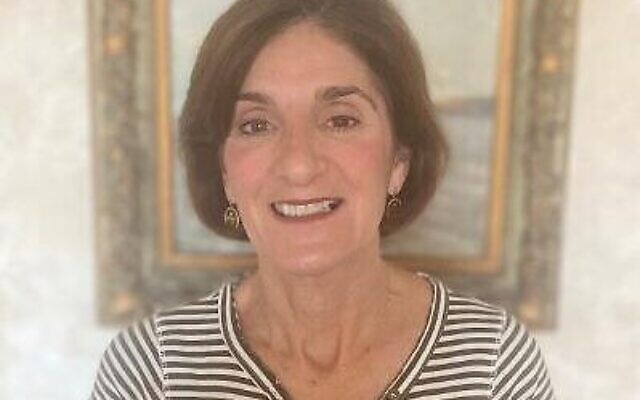
Temple Sinai, in collaboration with Temple Emanu-El, The Temple and Congregation Or Hadash, has been conducting a clothing drive and assembling welcome baskets for the Afghan families arriving in Atlanta. “We get a lot of support from our synagogue through this circle,” said Fishman, noting that 120 congregants are circle members, although they are not all active. “After the new year, we plan to adopt an Afghan family,” added Fishman.
Temple Sinai members are by no means the only Atlanta Jews scrambling to help welcome hundreds of Afghan immigrants. “Ever since the airlift captured the world’s attention,” the subject of Afghan evacuees kept coming up in conversation at Congregation Or Hadash (COH), reported Renee Videlefsky, a board member and Tikkun Olam committee chair.
COH immediately decided to take the adoption route. “It’s fine to donate money, but people really wanted to do more and have the opportunity to bond with a family in need and learn about another culture,” said Videlefsky, who has been working with immigrants since the late 1980s. She was a Jewish Big Sister to Russian immigrants, helping newcomers maneuver the system.
The COH committee has two co-chairs: Steve Levene and Naomi Binenfeld. “We want no more than eight core people,” said Videlefsky, explaining that there’s a vetting process through the resettlement agency they chose, called Inspiritus. The core group members will be trained and pass background checks before they can meet with the family of seven that has been assigned to COH. Once vetted, the group will be responsible for helping the family furnish their new home, learn English and adjust to life in America.

“There are different levels of adoption, including time and money,” said Videlefsky. “We are called a companion partner, which requires a commitment of $1,000 and three months. We’ll have no problem raising the money and this will be more than a three-month commitment. We really want to get our kids involved.”
As of November, COH’s donation web page gives contributors a choice of donating to the congregation’s Afghan Relief fund, in addition to the regular choices of education, kiddush, building fund or general fund.
Evacuees “literally come with just the clothing on their backs,” said Videlefsky. She appealed to the Jewish Moms of Atlanta Facebook page, asking for donations of children’s clothing and other items. “We got a wonderful response,” she reported.
Videlefsky is also a board member of the National Council of Jewish Women Atlanta Section, where she’s been involved in their Afghan relief efforts. Sherry Frank, co-president of NCJW, pointed out that the more than 100-year-old NCJW has always worked with immigrants. “At the turn of the [20th] century, we met Jews at Ellis Island, and also after World War II,” said Frank. In the 1970s, the local group worked with Jewish Family & Career Services of Atlanta to assist immigrants arriving from the Soviet Union.
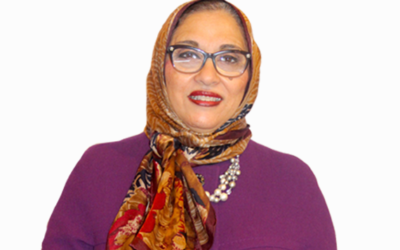
Members of NCJW are working with New American Pathways to make dozens of welcome baskets. But before doing so, Frank turned to the Islamic Speakers Bureau, created in August 2001 to build bridges of understanding and create interfaith partnerships. ISB Executive Director Soumaya Khalifa conducted a cultural training course for the individuals assisting the Afghan refugees.
“Most of us didn’t know much about the history, religion and cultural nuances of Afghanistan,” said Frank. “Soumaya’s training is so fabulous.” Among other nuances, the group was taught that women shouldn’t shake hands with religious men, just as is the custom among many Orthodox Jews. The training also included advice about what to put in the welcome gift bags. Any food has to be halal. Afghans like black and green teas.
Other essential items included toiletries, games, puzzles, dictionaries and toys. Various synagogues are also encouraging people to buy gift cards — especially from Target, Walmart and Macy’s.
As of Nov. 15, New American Pathways (NAP) alone welcomed 107 Afghan refugees to Atlanta, with another 100 expected the following week. “By year end 2021, we will have 250 from Afghanistan and we expect another 150 in early 2022,” said Nancy Gaddy, chief advancement officer of NAP.
The biggest challenge to resettlement is a lack of housing, according to Aimee Zangandou, director of refugee and immigrant services for Inspiritus. “There’s a housing shortage and rents are so expensive. We need lessors who are willing to work with the agency.” Meanwhile, some of the Afghan families already in Atlanta are being housed temporarily in hotels and Airbnb vacation rentals.
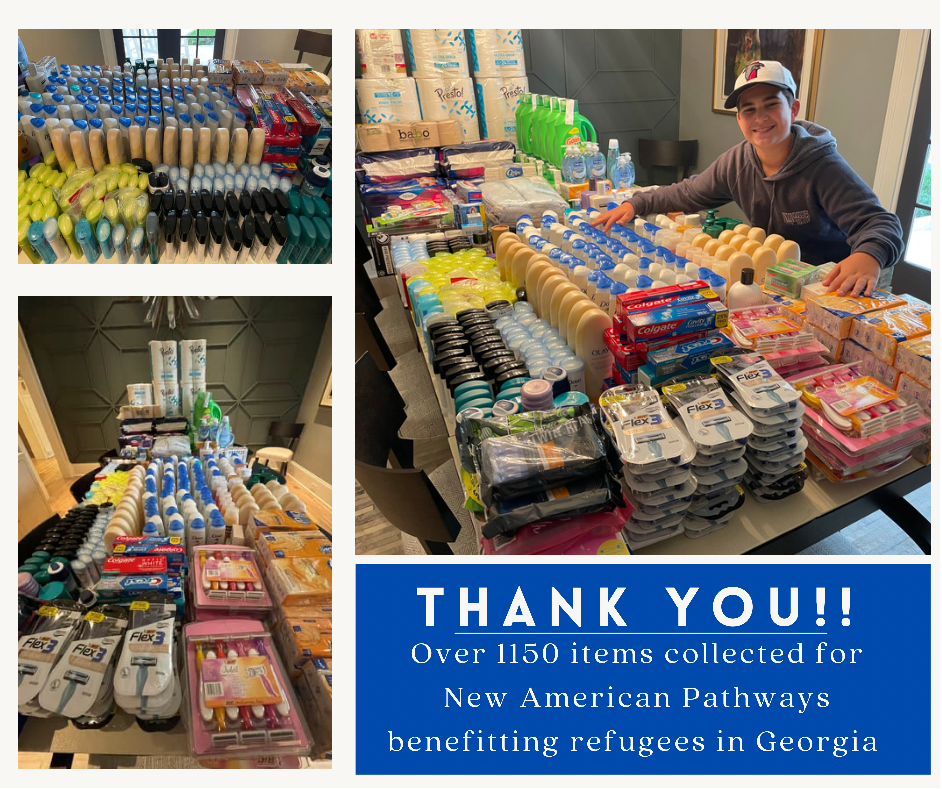
B’nai mitzvah children are joining the efforts as well. Temple Sinai member Elijah Levin collected more than 1,300 items for his bar mitzvah project.
Frank explains that although the latest group of immigrants seeking refuge in Atlanta may not be Jewish, it’s not surprising that the Jewish community is so welcoming. “There’s no Jewish connection,” she said. “It’s just Jewish tradition. We were once immigrants.”
- Jan Jaben-Eilon
- News
- Local
- Temple Sinai
- Atlanta
- Elijah Levin
- bar mitzvah project
- Islamic Speakers Bureau
- Soumaya Khalifa
- Sherry Frank
- National Council of Jewish Women – Atlanta
- Jane Fishman
- Refugees
- Renee Videlefsky
- Congregation Or Hadash
- Atlanta Jewish Community
- Afghan
- Kabul Airport
- Afghanistan
- President Joe Biden
- General Kenneth McKenzie
- U.S. Central Command
- U.S. military bases
- Leslie Walden
- Immigrant & Refugee Justice Campaign
- distributing food
- detention centers
- New American Pathways
- Temple Emanu-El
- temple
- clothing drive
- Afghan family
- Tikkun Olamm
- Jewish Big Sister
- Steve Levene
- Naomi Binenfeld
- Inspiritus
- Afghan Relief fund
- education fund
- kiddush fund
- building fund
- general fund
- cultural training course
- Jewish Moms of Atlanta Facebook group
- Ellis Island
- World War II
- Soviet Union
- Jewish Family & Career Services of Atlanta
- Welcome Baskets
- interfaith partnerships
- Orthodox Jews
- halal
- Target
- Walmart
- Macy's
- Nancy Gaddy
- Aimee Zangandou
- Airbnb
- jewish community





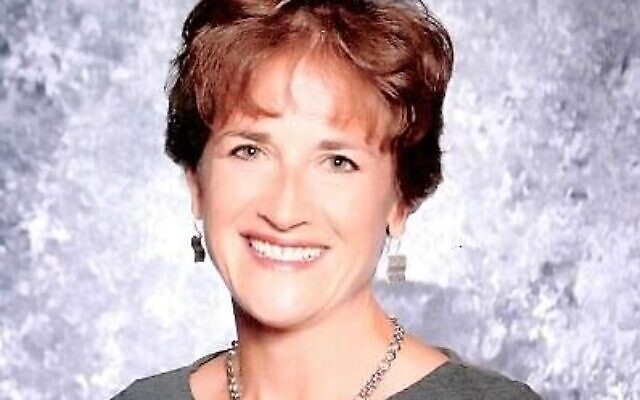
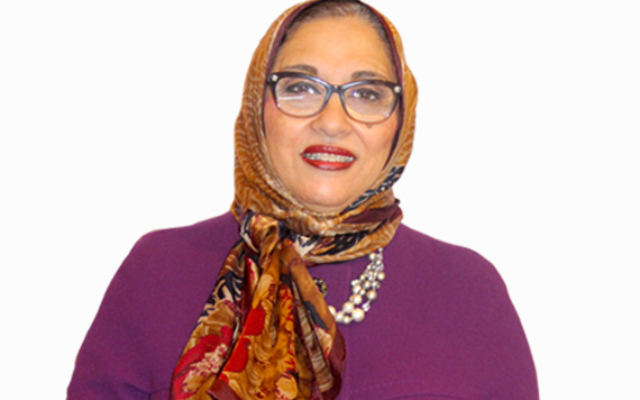
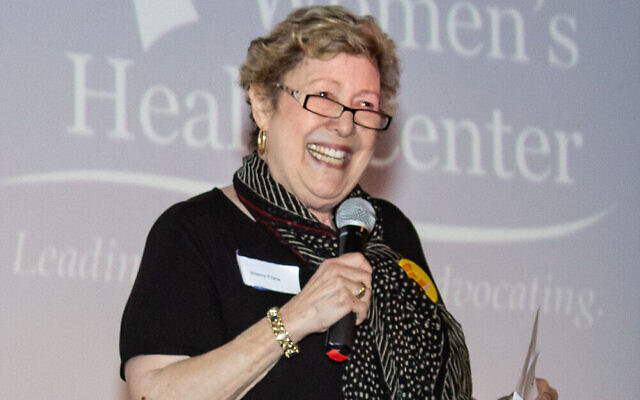
comments